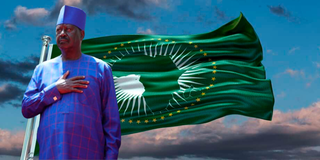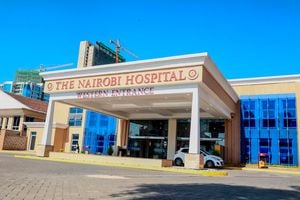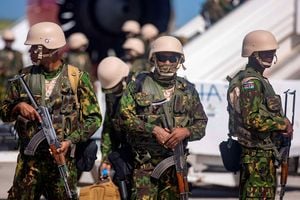
Raila Odinga’s candidacy for the AUC chairmanship could redefine his legacy.
Former Prime Minister Raila Odinga’s pursuit of the African Union Commission (AUC) chairmanship appears to be off to a strong start, but the veteran opposition leader still confronts several hurdles that could disrupt his quest.
The just concluded Forum on China-Africa Cooperation Summit provided the best opportunity for President William Ruto to present Mr Odinga’s case to his fellow African Heads of State and Government. Coming days after a major launch of Mr Odinga’s candidacy in the presence of East African presidents, the campaign for the coveted continental post began on the right footing.
But international relations experts say Mr Odinga should not stop the campaign yet. They say that the government must work extra hard to ensure it corrects the mistakes that cost the country the seat in the 2017 elections.
Former Foreign Affairs Cabinet Secretary Amina Mohamed lost the seat in the 2017 poll to outgoing chairman Moussa Faki Mahamat of Chad after seven rounds of voting.
Experts say that Kenya’s abandonment of neutrality in global politics when US President Joe Biden designated the country as a major non-Nato ally, the Francophone question, a possible stab in the back by neighbours during the secret ballot and age factors should be major concerns during the AUC chairperson’s election scheduled for February next year.
There are also concerns about Mr Odinga’s 2018 mock swearing-in as the “people’s president” as well as accusations of being cosy with several opposition leaders across the continent that could cause apprehension among some Heads of State who take part in the election.
During Mr Odinga’s unveiling last month, Uganda President Yoweri Museveni appeared to wade into the debate on Mr Odinga’s allies’ close association with the opposition in his country.
“There are some individuals in Raila’s group who I don’t think know what they are doing. I am a consumer of intelligence services. I always see intelligence service reports. There’s a character called Babu. I always see Babu dealing with anti-NRM groups in Uganda,” the Ugandan President said, in reference to Embakasi East MP Babu Owino, a Member of Parliament in Mr Odinga’s ODM party.
Having served in the opposition for nearly three decades, Mr Odinga has made friends with opposition figures in many African nations — something that could rattle some presidents.
Former Nigeria President Olusegun Obasanjo — a key cog in Mr Odinga’s election bid — for instance, campaigned against the current Nigeria President Bola Tinubu during the elections.
Opposition role
Mr Odinga will be under sharp focus ahead of AUC chairmanship position candidates’ debate dubbed MjadalaAfrica due to his continued hold onto his opposition roles, as well as his 2018 mock swearing-in as the ‘people’s president’ after losing the election to Mr Uhuru Kenyatta.
Former Vice President Kalonzo Musyoka and Prime Cabinet Secretary Musalia Mudavadi, who were with Mr Odinga in the National Super Alliance (Nasa), skipped the ceremony, citing its illegality.
Mr Musyoka said that he skipped the event to safeguard his future in politics “As a senior counsel, how would I have participated in a mock, illegal and unconstitutional oath?” He asked.
University of the Witwatersrand International Relations and Diplomacy professor Gilbert Khadiagala argues that Kenya’s major hurdles in its AUC quest are primarily reputational.
“President Ruto’s abandonment of Kenya’s global neutrality in favour of an ambiguous non-Nato membership has hurt the country’s reputation in Africa very profoundly, particularly among Southern African countries (South Africa and Zimbabwe) that are often closeted, but rabid anti-American nations.
If you broaden the anti-American bloc to the new radical regimes in the Sahel and West Africa, you begin to get the picture of how this shift may affect the elections for the AUC chair,” Prof Khadiagala, who heads the Africa Centre for the Study of the United States in Johannesburg, South Africa, told Sunday Nation.
He argues that there are many countries in Africa that believe that a country at the helm of the AUC should be as neutral as possible on global politics even though some of them do not adhere to this principle.
“The second hurdle is although Kenya is nominally the lead State in Eastern Africa, it has many competitors that would be inclined to stab the country in the back, particularly in secret ballot elections. Kenya cannot entirely trust countries such as the Democratic Republic of Congo, Somalia, and others,” Prof Khadiagala says.
The Executive Director of Centre on International Cooperation Martin Kimani says Kenya must invest considerable resources for Mr Odinga to secure the seat.
“Raila’s chances are good, he is a strong candidate and he has the government behind him. But he is going to have to compete for the position. Djibouti Foreign Affair Minister Mahamoud Ali Youssouf is probably his strongest rival. Raila has an equally good chance of missing the job because Mr Youssouf comes with a lot of experience and strong endorsements from regional organisations,” Mr Kimani, Kenya’s former permanent representative to the United Nations, said.
Prof Maria Nzomo of International Relations and Diplomacy Institute at the University of Nairobi says it is too early to predict the winner in the coming polls.
“It will be speculative to say with finality that Kenya is either going to win or lose. Africa is a bit complex and there are a lot of ideological, linguistic issues that have a huge dose of impact. Francophones have their values, Anglophones also have what they stand for,” she said.
Prof Nzomo, who has served as Kenya’s ambassador and permanent representative to the United Nations, World Trade Organization in Geneva, Switzerland, as well as in Zimbabwe, and other Southern African countries, describes the AUC elections as unpredictable, adding that some countries which pledge support could change at the last minute.
“A lot of horse trading happens. Raila Odinga is strong but is also facing other very strong candidates and the government has to put out strong strategies to win the seat,” adds Prof Nzomo.
Prof Khadiagala notes that Mr Odinga’s candidacy itself also presents significant hurdles. “This is a full-time job that is fast-paced, and intense and would require a candidate with agility and energy that he doesn’t have at his age.
Most of the people working at that AU have surreptitiously complained about this age since the nomination. They may not have influence on the vote, but some have solid links with countries that seconded them there,” Prof Khadiagala told Nation.
Another expert in international relations and diplomacy Francis Mwangangi says that Kenya has good standing in continental affairs that boosts its prospects.
“Our candidate is the most credible and most qualified but what remains is our strategy and geopolitical execution towards ensuring he wins,” says Mr Mwangangi who is also the Machakos deputy governor
He says it is important for Kenya to build regional consensus across the five regions and to handle external influencers like the West and East with care to ensure support.
“We must also note that as we court other nations, especially the external influencers, we must be cognizant of their solid democratic groundings.
“The recent youth protests that led to forced disappearance and shooting of innocent youth all can work to our disadvantage among the international friends which hold immense influence in African affairs,” stated Mr Mwangangi.
A candidate being backed by a government seen to be violating human
rights “of that magnitude might just play to the disadvantage of our candidate.”
Mr Odinga is facing Djibouti’s Minister of Foreign Affairs Mahmoud Youssouf, former Mauritius Foreign Minster Anil Kumarsingh Gayan and his former Madagascar counterpart Richard James Randriamandrato.
Djibouti, Prof Khadiagala says, has a strong candidate but in numbers and reputation alone, Kenya nominally seems to have the upper hand.
“The major problem with mobilising beyond Eastern/Southern Africa is the Francophone factor: most of the West African Francophone and Lusophone countries may not support the Kenyan candidate.
“Already these countries (under the aegis of the Islamic organization) have intimated they will not vote for a non-Francophone. So, unless the campaign focuses on overcoming this cultural/linguistic/religious schism, it is going to be difficult for Raila to prevail. Remember that some of the French-speaking countries are also in North Africa (Mauritania, Tunisia, Algeria, Morocco). If you combine them with the West Africa proper, there are lots of Francophone countries in Africa than most of us imagine,” argues the University of the Witwatersrand-based professor.
The international relations expert says it would be difficult to obtain victory in the first round “unless you have a Solomonic candidate!”
“AU elections are very competitive and it's often impossible to marshal the consensus for a first-round victory. In the worst-case scenario, none of the candidates would be found acceptable and the process may be extended to the next AU meeting thus allowing the current Chair to continue.”
Like in any election, Mr Mwangangi argues that Kenyan opponents will continue pocking holes in Mr Odinga’s eligibility for the AUC post.
“They will not hesitate to bring in the issue of his mock swearing-in to accuse him of attempting to overturn a legitimately elected government.”
“But we must also to alive to the fact that Mr Odinga’s fight for democratic space in this country overrides some of his faults. He can use this as a strength to overcome such accusations,” added Mr Mwangangi.










